iOS 主流搜索界面下的Tag标签布局框架,各种样式任君挑选,包您满意(SKTagView)
Posted Deft_MKJing宓珂璟
tags:
篇首语:本文由小常识网(cha138.com)小编为大家整理,主要介绍了iOS 主流搜索界面下的Tag标签布局框架,各种样式任君挑选,包您满意(SKTagView)相关的知识,希望对你有一定的参考价值。
每个App的搜索界面下边都会有热门搜索,历史搜索之类的标签,这里介绍个框架,既可以非常容易实现标签类的不规则流式布局,也可以实现固定宽度和高度的布局,也支持Autolayout,使用起来也是非常舒服。SKTagView原框架下只有根据文字宽度不固定的的模式,那么如果需求有固定宽高模式的,老规矩,只能改源码了.
请看图:



传统模式:
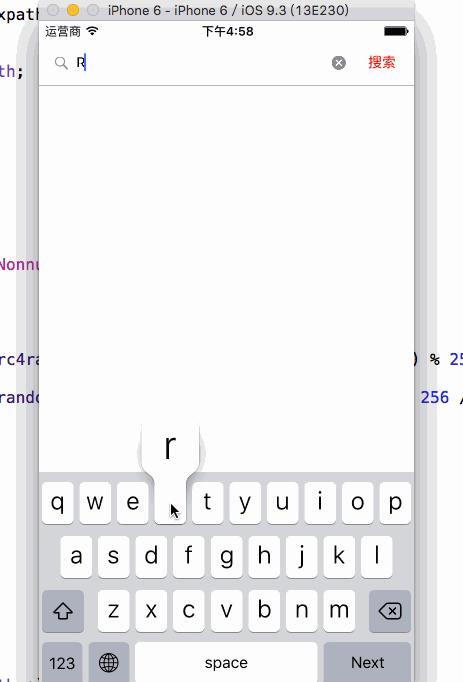
TableView cell模式的不规则模式和固定宽高模式:
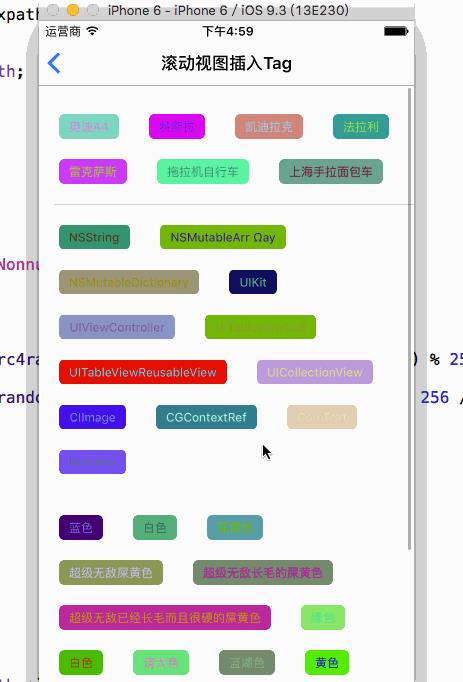
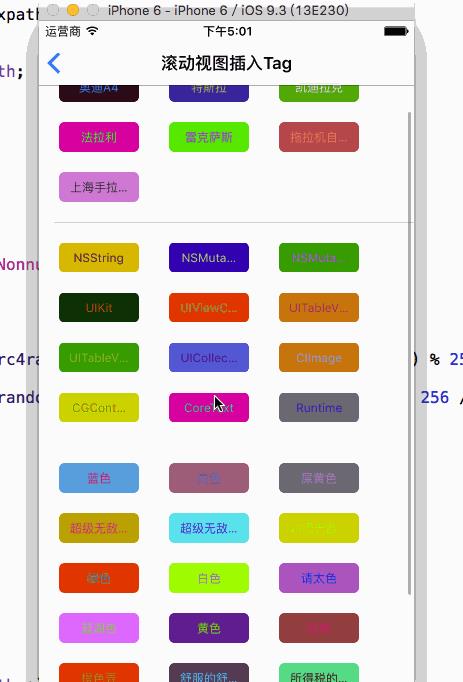


电影放完了,开始简单介绍下
这里有两个能用到的地方(截图来自淘宝)
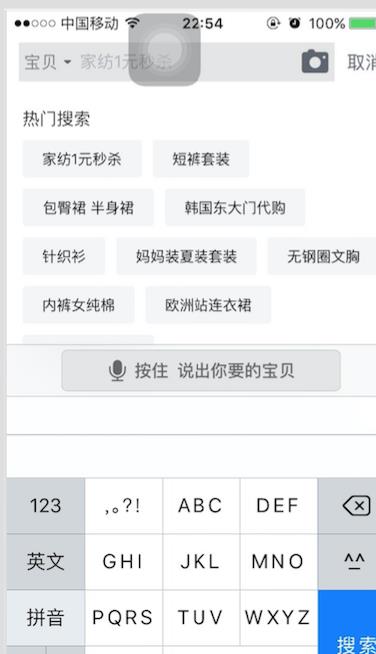
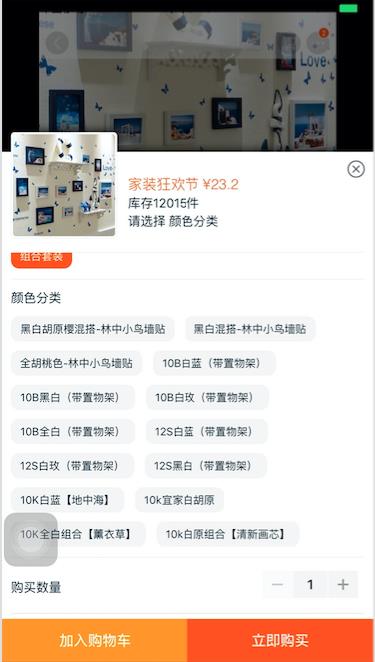
OK,根据以上两个用途,写了两个简单的Demo,无需再繁琐的计算了,直接导入
SKTagView来进行布局,非常简单
Demo地址:https://github.com/DeftMKJ/SKTag
Demo1
首先
创建一个UISearchBar来进行模拟搜索
- (void)viewDidLoad {
[super viewDidLoad];
// Do any additional setup after loading the view from its nib.
UIView *titleView = [[UIView alloc] initWithFrame:CGRectMake(0, 0, 375, 44)];
titleView.backgroundColor = [UIColor clearColor];
self.searchBar = [[UISearchBar alloc] initWithFrame:CGRectMake(0, 0, 360, 44)];
self.searchBar.delegate = self;
self.searchBar.placeholder = @"请输入要搜索的文字";
// self.searchBar.showsCancelButton = YES;
// 键盘确认按钮的名字
self.searchBar.returnKeyType = UIReturnKeyNext;
// 把默认灰色背景浮层给去掉
self.searchBar.backgroundColor = [UIColor clearColor];
self.searchBar.backgroundImage = [UIImage new];
UITextField *searBarTextField = [self.searchBar valueForKey:@"_searchField"];
if (searBarTextField)
{
[searBarTextField setBackgroundColor:[UIColor colorWithRed:243/255.0 green:243/255.0 blue:243/255.0 alpha:1]];
searBarTextField.borderStyle = UITextBorderStyleRoundedRect;
searBarTextField.layer.cornerRadius = 5.0f;
}
else
{
// 通过颜色画一个Image出来
UIImage *image = [UIImage imageWithColor:[UIColor colorWithRed:243/255.0 green:243/255.0 blue:243/255.0 alpha:1] forSize:CGSizeMake(28, 28)];
[self.searchBar setSearchFieldBackgroundImage:image forState:UIControlStateNormal];
}
[titleView addSubview:self.searchBar];
self.navigationItem.titleView = titleView;
[self.searchBar becomeFirstResponder];
[self configTagView];
}来看看效果哈

但是你们有没有觉得他右边的Cancel一点都协调么,要改了它,但是这东西
系统又没有给属性接口让你改......


那么试着咱们把SearchBar下面的Subviews统统打印出来看一下

咦???这个数组里面只有个UIView么,不科学啊,要不再拨开一层看看

 NICE啊,这波操作可以啊,找到了,藏那么里面,既然找到了,就在这个代理方法里面进行修改
NICE啊,这波操作可以啊,找到了,藏那么里面,既然找到了,就在这个代理方法里面进行修改
- (void)searchBarTextDidBeginEditing:(UISearchBar *)searchBar{
// (lldb) po self.searchBar.subviews[0].subviews
// <__NSArrayM 0x7ffba1e08330>(
// <UISearchBarBackground: 0x7ffba1c670e0; frame = (0 0; 360 44); opaque = NO; userInteractionEnabled = NO; layer = <CALayer: 0x7ffba1c201a0>>,
// <UISearchBarTextField: 0x7ffba1c905b0; frame = (0 0; 0 0); text = ''; clipsToBounds = YES; opaque = NO; layer = <CALayer: 0x7ffba1c90360>>,
// <UINavigationButton: 0x7ffba1c982c0; frame = (0 0; 53 30); opaque = NO; layer = <CALayer: 0x7ffba1c98800>>
// )
//
// (lldb) po self.searchBar.subviews
// <__NSArrayM 0x7ffba1e77280>(
// <UIView: 0x7ffba1c8a470; frame = (0 0; 360 44); clipsToBounds = YES; autoresize = W+H; layer = <CALayer: 0x7ffba1c7ddc0>>
// )
searchBar.showsCancelButton = YES;
for(UIView *view in [[[searchBar subviews] objectAtIndex:0] subviews]) {
if([view isKindOfClass:[NSClassFromString(@"UINavigationButton") class]]) {
UIButton * cancel =(UIButton *)view;
[cancel setTitle:@"搜索" forState:UIControlStateNormal];
cancel.titleLabel.font = [UIFont systemFontOfSize:14];
cancel.tintColor = [UIColor redColor];
}
}}修改完后的效果(Mac这截图效果也是醉了 )
)

然后
我们来创建SKTagView,各种属性已经加上注释
// 配置
- (void)configTagView
{
self.label = [[UILabel alloc] initWithFrame:CGRectMake(10, 90, 100, 30)];
self.label.textColor = [UIColor blackColor];
self.label.font = [UIFont systemFontOfSize:13];
self.label.text = @"历史搜索";
[self.view addSubview:self.label];
// 先移除掉所有
[self.tagView removeAllTags];
// 初始化
self.tagView = [[SKTagView alloc] init];
// 整个tagView对应其SuperView的上左下右距离
self.tagView.padding = UIEdgeInsetsMake(10, 10, 10, 10);
// 上下行之间的距离
self.tagView.lineSpacing = 10;
// item之间的距离
self.tagView.interitemSpacing = 20;
// 最大宽度
self.tagView.preferredMaxLayoutWidth = 375;
// @property (assign, nonatomic) CGFloat regularWidth; //!< 固定宽度
// @property (nonatomic,assign ) CGFloat regularHeight; //!< 固定高度
// 原作者没有能加固定宽度的,自己修改源码加上了固定宽度和高度,默认是0,就是标签式布局,如果实现了,那么就是固定宽度高度
// self.tagView.regularWidth = 100;
// self.tagView.regularHeight = 30;
// 开始加载
[self.dataSource enumerateObjectsUsingBlock:^(id _Nonnull obj, NSUInteger idx, BOOL * _Nonnull stop) {
// 初始化标签
SKTag *tag = [[SKTag alloc] initWithText:self.dataSource[idx]];
// 标签相对于自己容器的上左下右的距离
tag.padding = UIEdgeInsetsMake(3, 15, 3, 15);
// 弧度
tag.cornerRadius = 3.0f;
// 字体
tag.font = [UIFont boldSystemFontOfSize:12];
// 边框宽度
tag.borderWidth = 0;
// 背景
tag.bgColor = [UIColor colorWithRed:244/255.0 green:244/255.0 blue:244/255.0 alpha:1];
// 边框颜色
tag.borderColor = [UIColor colorWithRed:191/255.0 green:191/255.0 blue:191/255.0 alpha:1];
// 字体颜色
tag.textColor = [UIColor colorWithRed:53/255.0 green:53/255.0 blue:53/255.0 alpha:1];
// 是否可点击
tag.enable = YES;
// 加入到tagView
[self.tagView addTag:tag];
}];
// 点击事件回调
self.tagView.didTapTagAtIndex = ^(NSUInteger idx){
NSLog(@"点击了第%ld个",idx);
};
// 获取刚才加入所有tag之后的内在高度
CGFloat tagHeight = self.tagView.intrinsicContentSize.height;
NSLog(@"高度%lf",tagHeight);
// 根据已经得到的内在高度给SKTagView创建frame
self.tagView.frame = CGRectMake(0, 120, 375, tagHeight);
[self.tagView layoutSubviews];
[self.view addSubview:self.tagView];
}最后
在UISearchBar的代理方法里面实现搜索的时候隐藏,不搜索的时候显示
- (void)searchBar:(UISearchBar *)searchBar textDidChange:(NSString *)searchText
{
NSLog(@"%@",searchText);
if (searchText.length == 0) {
// 没有文字了
self.label.hidden = NO;
self.tagView.hidden = NO;
}
else
{
self.label.hidden = YES;
self.tagView.hidden = YES;
}
}三步做完,一个简单的Demo就做完了,简单到爆......
下面咱们来看看如何让他在TableViewCell里面实现高度自适应的
(需要用到的库UITableView+FDTemplateLayoutCell--->传送门)
Demo2
首先
用Xib做一个SKTagView的Cell

然后
不需要给SKTagView指定Frame了,约束已经做好,只要实现下面的代码就好了
- (void)configCell:(MKJTagViewTableViewCell *)cell indexpath:(NSIndexPath *)indexpath
{
[cell.tagView removeAllTags];
cell.tagView.preferredMaxLayoutWidth = [UIScreen mainScreen].bounds.size.width;
cell.tagView.padding = UIEdgeInsetsMake(20, 20, 20, 20);
cell.tagView.lineSpacing = 20;
cell.tagView.interitemSpacing = 30;
cell.tagView.singleLine = NO;
// 给出两个字段,如果给的是0,那么就是变化的,如果给的不是0,那么就是固定的
cell.tagView.regularWidth = 80;
cell.tagView.regularHeight = 30;
NSArray *arr = [self.dataSource[indexpath.row] valueForKey:@"first"];
[arr enumerateObjectsUsingBlock:^(id _Nonnull obj, NSUInteger idx, BOOL * _Nonnull stop) {
SKTag *tag = [[SKTag alloc] initWithText:arr[idx]];
tag.font = [UIFont systemFontOfSize:12];
tag.textColor = [UIColor colorWithRed:arc4random() % 256 / 255.0 green:arc4random() % 256 / 255.0 blue:arc4random() % 256 / 255.0 alpha:1];
tag.bgColor =[UIColor colorWithRed:arc4random() % 256 / 255.0 green:arc4random() % 256 / 255.0 blue:arc4random() % 256 / 255.0 alpha:1];
tag.cornerRadius = 5;
tag.enable = YES;
tag.padding = UIEdgeInsetsMake(5, 10, 5, 10);
[cell.tagView addTag:tag];
}];
cell.tagView.didTapTagAtIndex = ^(NSUInteger index)
{
NSLog(@"点击了%ld",index);
};
}
- (CGFloat)tableView:(UITableView *)tableView heightForRowAtIndexPath:(NSIndexPath *)indexPath
{
return [tableView fd_heightForCellWithIdentifier:identyfy configuration:^(id cell) {
[self configCell:cell indexpath:indexPath];
}];
}差不多两个简单的Demo就介绍到这里了,再提一点东西,原作者是没有固定宽度这个属性的,没办法,自己动手丰衣足食了,我改了下源码,主要加了两个字段,默认是0,那么出来的效果就是不规则的,宽度随文字而变化,如果赋值这两个字段,那么就是固定宽高,上面已经给出了效果图
@property (assign, nonatomic) CGFloat regularWidth; //!< 固定宽度
@property (nonatomic,assign ) CGFloat regularHeight; //!< 固定高度@interface SKTagView ()
@property (strong, nonatomic, nullable) NSMutableArray *tags;
@property (assign, nonatomic) BOOL didSetup;
@property (nonatomic,assign) BOOL isIntrinsicWidth; //!<是否宽度固定
@property (nonatomic,assign) BOOL isIntrinsicHeight; //!<是否高度固定
@end
@implementation SKTagView
// 重写setter给bool赋值
- (void)setRegularWidth:(CGFloat)intrinsicWidth
{
if (_regularWidth != intrinsicWidth) {
_regularWidth = intrinsicWidth;
if (intrinsicWidth == 0) {
self.isIntrinsicWidth = NO;
}
else
{
self.isIntrinsicWidth = YES;
}
}
}主要在下面这个放里面引入了两个判断
CGFloat width1 =self.isIntrinsicWidth?self.regularWidth:size.width;
CGFloat height1 =self.isIntrinsicHeight?self.regularHeight:size.height;
#pragma mark - Private
- (void)layoutTags {
if (self.didSetup || !self.tags.count) {
return;
}
NSArray *subviews = self.subviews;
UIView *previousView = nil;
CGFloat topPadding = self.padding.top;
CGFloat leftPadding = self.padding.left;
CGFloat rightPadding = self.padding.right;
CGFloat itemSpacing = self.interitemSpacing;
CGFloat lineSpacing = self.lineSpacing;
CGFloat currentX = leftPadding;
if (!self.singleLine && self.preferredMaxLayoutWidth > 0) {
for (UIView *view in subviews) {
CGSize size = view.intrinsicContentSize;
CGFloat width1 = self.isIntrinsicWidth?self.regularWidth:size.width;
CGFloat height1 = self.isIntrinsicHeight?self.regularHeight:size.height;
if (previousView) {
// CGFloat width = size.width;
currentX += itemSpacing;
if (currentX + width1 + rightPadding <= self.preferredMaxLayoutWidth) {
view.frame = CGRectMake(currentX, CGRectGetMinY(previousView.frame), width1, height1);
currentX += width1;
} else {
CGFloat width = MIN(width1, self.preferredMaxLayoutWidth - leftPadding - rightPadding);
view.frame = CGRectMake(leftPadding, CGRectGetMaxY(previousView.frame) + lineSpacing, width, height1);
currentX = leftPadding + width;
}
} else {
CGFloat width = MIN(width1, self.preferredMaxLayoutWidth - leftPadding - rightPadding);
view.frame = CGRectMake(leftPadding, topPadding, width, height1);
currentX += width;
}
previousView = view;
}
} else {
for (UIView *view in subviews) {
CGSize size = view.intrinsicContentSize;
view.frame = CGRectMake(currentX, topPadding, self.isIntrinsicWidth?self.regularWidth:size.width, self.isIntrinsicHeight?self.regularHeight:size.height);
currentX += self.isIntrinsicWidth?self.regularWidth:size.width;
previousView = view;
}
}
self.didSetup = YES;
}
以上是关于iOS 主流搜索界面下的Tag标签布局框架,各种样式任君挑选,包您满意(SKTagView)的主要内容,如果未能解决你的问题,请参考以下文章